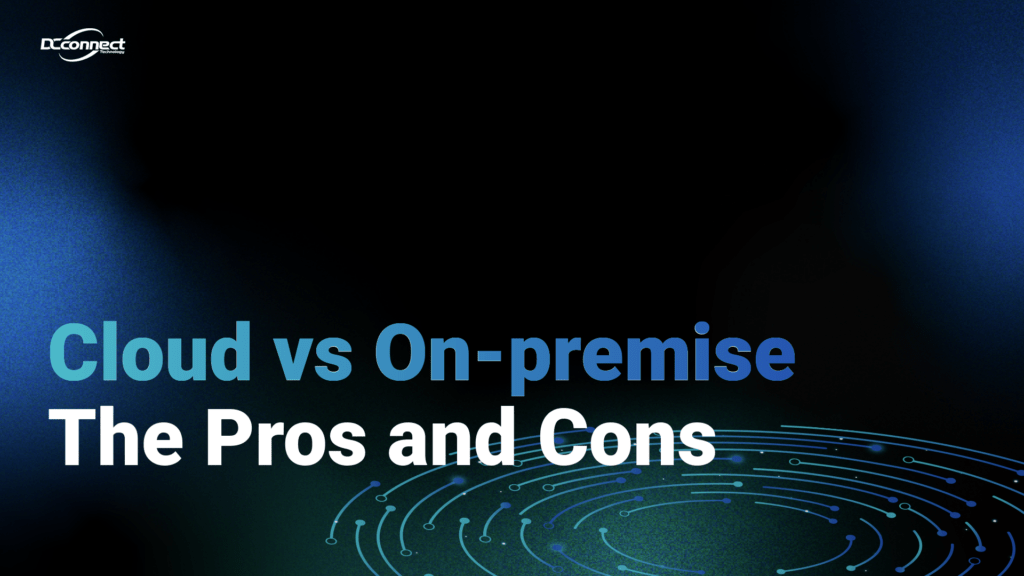
What is better: on-premises or cloud? The debate between on-premises and cloud infrastructure has long been a hot topic for businesses of all sizes. Whether you’re a well-established company considering a move to the cloud or a start-up weighing the benefits of on-premises systems, it’s crucial to understand the unique advantages and challenges of each option.
Deciding how to store and manage data is a critical consideration for any company. With cloud, data is stored and processed over a network of servers. On-premises infrastructure, on the other hand, operates on servers within the company’s physical premises. Despite their differences, both approaches strive to optimize costs, minimize maintenance requirements, and maximize IT agility by implementing robust and flexible infrastructure solutions.
Cloud vs. On-Premises
Through the cloud, businesses can tap into an expansive array of computing assets, ranging from servers and storage to applications and beyond, all accessible via the internet. Rather than being physically installed and maintained on local hardware, these resources are provided by a third-party service provider and accessed through the web.
The cloud offers organizations a scalable, flexible, and cost-effective way to manage their computing needs. By utilizing the cloud, businesses can eliminate the need for hardware and software procurement and maintenance and enjoy quick and easy access to their information from anywhere, at any time.
Moreover, the cloud enables organizations to minimize their IT costs while maximizing operational efficiency. The cloud service provider is responsible for maintaining and upgrading the infrastructure, freeing the in-house IT team to focus on strategic initiatives.
Taking the example of DCConnect, leveraging the scalability, reliability, and security offered by cloud platforms like Microsoft Azure, AWS Direct Connect, Google Cloud, and Alibaba Cloud, DCConnect was able to meet the growing demand for its services without having to worry about the underlying infrastructure.
In contrast, on-premises refers to a technology solution where hardware, software, and other IT resources are installed and operated within an organization’s physical facilities. This differs from the cloud, where resources are hosted and maintained by a third-party service provider and accessed over the internet.
On-premises offers organizations complete control over their IT environment, including the management and customization of hardware and software. It also provides organizations with greater security, as all data and applications reside within the company’s premises and are protected by its security measures.
However, on-premises also presents certain challenges and limitations. For example, it requires significant upfront capital investment and ongoing maintenance and support costs. Scaling an on-premises environment can also be complex and require additional investment in hardware and software.
What are the Pros and Cons of the Cloud?
In today’s fast-paced business world, it’s essential to have access to efficient and cost-effective technology solutions. One option that’s become increasingly popular is cloud. Cloud offers many benefits to organizations, from cost savings to scalability. This passage will delve into the top advantages of using cloud solutions and how it can help organizations thrive in an ever-evolving digital landscape.

What are the Pros and Cons of On-Premises?
On-premises solutions, which refer to hosting IT infrastructure and applications within a company’s physical location, have been the traditional approach for businesses to manage their IT systems. Here are the pros and cons of on-premiss.
Which Is The Right For My Business?
Choosing between cloud and on-premises solutions for a business can be a difficult choice, as both options have pros and cons. However, an increasing number of companies are exploring the possibility of a hybrid cloud approach, which allows them to benefit from the advantages of both solutions.
Hybrid cloud is a combination of public and private cloud services, providing organizations with the benefits of both cloud delivery models. It enables organizations to maintain control over critical data and applications while leveraging the scalability and cost-effectiveness of the public cloud.
DC Gateway, a SaaS application offered by DCConnect. It connects your network facilities in a Data Centre to the DCConnect global Ecosystem, allowing you to access over 1000+ POPs and 200+ Cloud platforms. In addition, DCConnect Global Limited offers a range of services that can help businesses take advantage of the benefits of the cloud.
Here are some of the key reasons why businesses are opting for the hybrid cloud.
One of the reasons for considering a hybrid cloud approach is the ability to have more control and customization over critical data and applications. With a hybrid cloud, companies can store sensitive data on-premises while utilizing the scalability and cost-effectiveness of the hybrid cloud for other applications. For example, DCConnect Global Limited, a provider of network services, leverages a hybrid cloud approach to ensure the security and reliability of their customers’ data while also taking advantage of the benefits of cloud.
Another reason to consider a hybrid cloud approach is the ability to Increased agility and innovation. A hybrid cloud model helps organizations increase their speed to market by optimizing IT performance and providing the agility needed to meet changing business demands. Because companies with a hybrid cloud aren’t limited to their private on-premise infrastructure, they can easily expand their workload on the cloud and more quickly test, prototype, and launch new products. This enables organizations like DCConnect Global Limited to continuously innovate while still meeting the demands of their customers.
In conclusion, businesses today face a complex set of challenges when it comes to choosing the right IT solutions for their needs. With cloud, on-premises, and hybrid cloud options, companies must weigh the benefits and drawbacks of each in order to find the best fit for their organization.
Cloud with DCConnect
Take the next step in optimizing your cloud management and utilization with DC Gateway. Our fully automated SDN network connects cloud users to over 200+ Cloud platforms, including Thailand, Middle East, and LATAM regions, providing scalable, reliable, and highly configurable connectivity services through a single-touch interface.

“DC Gateway” is your key to easy management and deployment of Cloud and Data Centre networks, connecting you to over 1000+ POPs and 200+ Cloud platform providers globally. With increased visibility into available clouds, you can attain seamless on-demand connectivity and streamline your cloud management and utilization.

Visit our website now and download our E-book to discover how it can benefit your business. Learn how DC Gateway proves to be the optimal solution for enterprises looking to take their cloud management to the next level.



